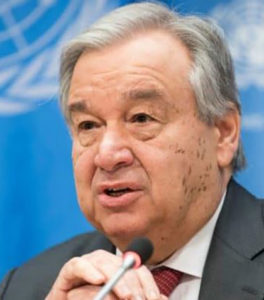UN calls for protection of refugees, migrants under COVID-19
Then United Nations has called for increased protections for migrants and refugees amid the COVID-19 pandemic, reminding countries of their obligations to people on the move.
In a video accompanying the release of a UN policy brief for aiding migrants and refugees during the pandemic, UN Secretary General Antonio Guterres said the pandemic crisis was compounding the dire situation currently faced by the more than 70 million people worldwide who have fled violence, disaster or precarious financial situations in their home countries.
 Mr Guterres said the pandemic was subjecting millions of people on the move to three crises rolled into one: a health crisis due to the virus, a socio-economic crisis as they often work in the informal economy that has been harmed by governmental lockdowns and a crisis of protection as countries close their borders to them.
Mr Guterres said the pandemic was subjecting millions of people on the move to three crises rolled into one: a health crisis due to the virus, a socio-economic crisis as they often work in the informal economy that has been harmed by governmental lockdowns and a crisis of protection as countries close their borders to them.
Simultaneously, COVID-19 has caused xenophobia, racism and stigmatization to skyrocket, he said.
“We all have a vested interest to ensure that the responsibility of protecting the world’s refugees is equitably shared and that human mobility remains safe, inclusive and respects international human rights and refugee law,” the UN chief said.
“No country can fight the pandemic or manage migration alone, but together, we can contain the spread of the virus, buffer its impact on the most vulnerable and recover better for the benefit of all,” Mr Guterres said.
He said the pandemic could be an opportunity to “reimagine human mobility,” calling on the international community to pursue an inclusive public health and socio-economic response that addresses suppressing the virus, restarting economies and advancing the UN’s Sustainable Development Goals (SDGs).
Mr Guterres also urged the international community to put in place travel restrictions and border controls that respect human rights and international refugee protection principles, make coronavirus treatments available to everyone as “no one is safe until everyone is safe” and incorporate people on the move into their pandemic response solutions.
This group of people, he said, are on the frontlines of the coronavirus response as one in eight nurses worldwide is practicing in a country they were not born in.
“Let us remove unwarranted barriers, explore models to regularize pathways for migrants and reduce transaction costs for remittances,” he said.
While the pandemic continues to shatter lives and livelihoods across the globe, it is the most vulnerable who are being hit the hardest, Mr Guterres said.
This population includes refugees, internally displaced people and migrants in precarious situations, who are facing three crises rolled into one, according to the Secretary-General.
“In addition, the loss of income from COVID-19 is likely to lead to a colossal $109 billion drop in remittances”, said Mr Guterres.
“That’s the equivalent of nearly three-quarters of all official development assistance that is no longer being sent back home to the 800 million people who depend on it.”
He said there was a crisis surrounding protection, with more than 150 countries imposing border restrictions to contain the spread of the virus. The majority make no exceptions for people seeking asylum.
“And the already precarious situation of women and girls is ever more dire, as they face higher risks of exposure to gender-based violence, abuse and exploitation.”
Mr Guterres said the pandemic provided an opportunity to “reimagine human mobility”.
However, that will mean taking four key understandings into consideration, starting with acknowledging that exclusion is expensive.
“An inclusive public health and socio-economic response will help suppress the virus, restart our economies and advance the SDGs,” Mr Guterres said.
The UN chief also called for upholding human dignity in the face of the crisis, suggesting that lessons can be learned from those countries which have implemented travel restrictions and border controls while respecting international principles on refugee protection.
He also repeated a core message of the crisis: no one is safe until everyone is safe, and that medicines to diagnose and treat COVID-19 must be accessible to all people.
He said that “people on the move” were part of the solution, and called for countries to explore pathways that would regularise migration and reduce remittance transaction costs.
“We all have a vested interest to ensure that the responsibility of protecting the world’s refugees is equitably shared and that human mobility remains safe, inclusive, and respects international human rights and refugee law”, Mr Guterres said.












